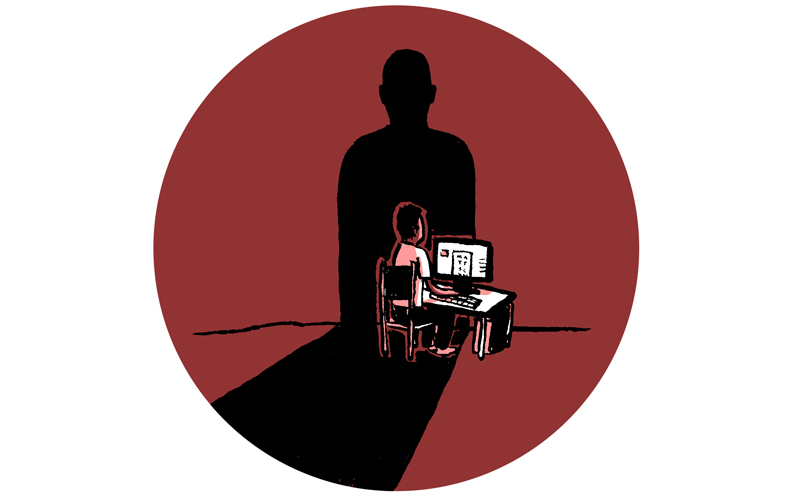

n April 25, 2014, Zelalem Kibret was sitting at his computer when he heard a knock at the door. Waiting on the other side stood a group of Ethiopian police officers. Kibret went on Facebook and typed out a quick post to his fellow bloggers, warning them of his imminent arrest. After he clicked “Enter,” Kibret was detained.
Within 15 minutes, all across Ethiopia, five more bloggers were taken into custody. They were taken from homes, classrooms and work and delivered to Maekelawi – an infamous police detention center in Addis Ababa, the country’s capital city.
The prison is known for not allowing its inhabitants to see the sun.
Over 8,000 miles away, in his Eugene, Oregon apartment, another Ethiopian blogger was stressed about finishing a class paper. It was getting late and deadline was approaching. Endalk Chala, 33, took a break from his essay and browsed Facebook to procrastinate.
Kibret’s post was waiting for him when he logged on. Frustration and anger smacked Chala like a quick jab. Then reality crept into his mind.
He was stuck in America.

Endalk Chala, a graduate student at the University of Oregon, is a blogger from Ethiopia. Shortly after he came to the United States his fellow bloggers were jailed. Facing jail if he returns to his home country, Chala advocates for their release from his blog, Trial Tracker.
“When you want to call home, or feel like meeting your mother or seeing your friends, and you can’t – that sinks into your system slowly,” Chala said. “That’s really bad.”
Chala expected this. He and his fellow bloggers understood that jail was a possibility if they took a stance against a state that prides itself on censorship. Ethiopia, a country that considers itself a republic in name, is home to no independent media outlets – that’s the purpose the bloggers decided to serve. They called their blog “Zone 9” – a site where they could “play with fire.”
Kaliti, the main long-term prison in Addis Ababa, is separated into eight zones. The Zone 9 blog was created to represent the eight zones in Kaliti – the ninth being the censored prison that is the country of Ethiopia.
The arrests of the Zone 9 bloggers set off what Chala called, “a very terrible time.” Emotionally, Chala said he was disturbed. He originally planned on using his experience as a Graduate Teaching Fellow at the University of Oregon’s School of Journalism and Communications to return home and to help expand and upgrade the Zone 9 blog.
Now he’s a man seeking asylum in the United States. He can’t go back to Ethiopia. If he did, he would be arrested immediately. But his interests are still close to home. In the past year, Chala has been proactive, trying to spread awareness of the Zone 9 arrests while his friends sit in prison, undergoing trial.
“There is a human aspect, faces to democracy,” Chala said, “and you can find them all across the media. People in this country shouldn’t take their freedom for granted.”


offee shops are some of the few places where uncensored, public conversations can take place in Ethiopia. The country is known as the birthplace of coffee. The drink of choice varies mainly between macchiatos and espressos – takeaways from Italy’s occupation in the region during World War II.
Sitting in Espresso Roma, a coffee shop in Eugene, Chala speaks freely. His big brown eyes light up at the freedom to answer a question. He thinks carefully, not fearfully, about each response. Unlike those in Ethiopia, he doesn’t have to look over his shoulder when he talks.
Growing up, Chala was at the top of his class – a bright student with excellent grades. The Ethiopian government took a special interest in him, which meant he couldn’t choose what profession he would train in. The government used its talented students to fill needs - Chala was forced to teach English.
He read English books and noticed a contradiction between western countries and his home in Ethiopia. In foreign books, censorship was nonexistent.
When Chala started teaching English in Ethiopia, he aimed to show his students what he had learned from studying western books. It wasn’t easy. Classrooms were filled with government spies, listening in on what teachers were telling their students. One day, Chala was called in to the school’s office where Ethiopian department of education representatives were waiting for him.
“Why are you doing this?” Chala rememebers them asking.
He wanted to show his students the world outside the government’s control.
Ethiopia, according to World Bank data, has a 1.9 percent Internet penetration rate. That means, two out of every 100 people in the country have access to the Internet. Still, the government has made it a priority to monitor that small amount of Internet users. According to a 2014 report from Human Rights Watch, a site dedicated to human rights worldwide, the Ethiopian government uses its control and surveillance over telecommunications as evidence against the people it arrests.
Danny O’Brien, the international director of the Electronic Frontier Foundation – a renowned non-profit that aims to defend worldwide civil liberties, spoke at a panel with Chala at the UO in March.
O’Brien said the Ethiopian government uses surveillance technologies to track down and keep tabs on select people. Anything that passes through a computer or gets said over the phone is evidence for the government. “It’s a pretty invasive form of software,” O’Brien said.
The Ethiopian government goes to great lengths to collect evidence on it’s enemies.

Two weeks after the Zone 9 arrests, police visited Chala’s home in Addis Ababa. They searched his room, taking books and other items. His mother, Menebere Lemma, and his sister, Alem, were interrogated by police.
In May 2013, U.S. Secretary of State John Kerry visited Addis Ababa. Zone 9 blogger Natnael Feleke was there. Before Kerry arrived, BBC HardTalk host Zeinab Badawi was practicing for the broadcast. According to Chala, she saw Feleke and asked him if she could practice with him. Feleke was tall, about the same height as Kerry, and perfect for practice. When Kerry arrived, Badawi told him that she used Feleke as a stand-in for Kerry in her pre-broadcast preparation.
Kerry called Feleke up to the stage. He looked at him, sized him up, shared a few laughs and smiles with the 27-year-old journalist in a checkered black, red and grey sweater. They posed for a photo.
Feleke was one of the bloggers arrested.
Part of Chala’s activist duties included manufacturing a smuggling system to get letters from the bloggers at Kaliti to Chala in Oregon.
Through the letters, Chala learned that Feleke, and the rest of the journalists, were beaten, tortured and interrogated. During Feleke’s interrogation, the police allegedly pulled out the photo of Feleke and Kerry.
“They asked him, ‘Out of all people, why did John Kerry personally ask you on stage? Did he ask you anything about the government?’” Chala said.
It takes Chala about a day to fully translate the letters from Amharic – the official language in Ethiopia – to English. He posts them to his current blog, Trial Tracker - his tool for raising awareness on Zone 9.
“It gives a real perspective to our readers,” he said.
The arrests of the Zone 9 bloggers prompted Melody Sundberg, a journalist, photographer and human rights activist in Sweden, to get involved. She saw posts on Twitter regarding the arrests of the bloggers. Angered, she reached out to Chala and asked if she could help. Sundberg has become a main contributor to the Trial Tracker Blog site. She also helped Chala produce a short animated, documentary to help raise awareness.
“The Zone 9 Bloggers did what most people would not dare to do,” Sundberg wrote in an e-mail. “They saw the violations against human rights and decided to do something about it. They wanted to spread a message. They chose to care. If we really need to ask: ‘Why should we care about about the jailings of bloggers?’ Then we really have a problem.”
The case against the Zone 9 bloggers adjourned for the 26th time on April 8. The ruling has been postponed until May 26.


fter a cup of coffee, Chala likes to go to the public parks around Eugene. They are quiet, serene and perfect to write, read or study. “The ideas will just flow,” Chala said. There, he’s free to do, and say, whatever he pleases. It’s quite the contradiction to the lockjaw, censored streets of Ethiopia.
He enjoys escaping to the parks, but the reality of his situation always returns. The past year has been rough for Chala. He’s stuck in America while his colleagues spend their days in Kaliti.
“We did something together,” Chala said regarding Zone 9. “This was our venture, our start up of telling stories.”
This feeling is called survivor’s guilt. Chala understands that his emotional status isn’t healthy, but he has never looked for psychiatric help. He has read books on the matter and identified survivor's guilt as his diagnosis. It comes and goes without any control.
“Like, when you attend classes and raise issues in discussions,” Chala described. “In the middle of discussion, you might remember this kind of stuff. I am in a privileged situation, while my friends are suffering.”
Despite the recurring guilt, Chala considers himself happy. When he discusses his situation, he does so with a smile – it’s his most striking feature. Sometimes, it’s also a disguise. He uses his smile to hide. Add that to what he calls, “his optimistic nature,” and you wouldn't guess this is a person seeking asylum.
“There are dark days and moments that really disappoint me,” Chala said. “But you have to get back to the light because time is going rapidly.
“In this speedy life, you have to be very careful to not expend your energy on something that doesn’t have any positive output on your life.”
Along with escaping to the park, Chala likes to sample the wide variety of dark craft beers in Oregon. It’s similar to Tella, a homemade drink in Ethiopia. He’s far from home, but each sip brings him back.
At his home in Eugene, Chala is joined by his wife, Betty Tessemma. She decided to move to the U.S. in February of last year – two months before the arrests happened. Chala says he’s lucky that he was able to get his wife here before the arrests.
When Chala first packed his bags to study at Oregon in September of 2013, he says he couldn’t imagine not returning. Now, that’s a possibility. He battles each day with intermittent guilt while balancing the stress of going to classes, grading papers and being an activist for the Zone 9 cause.
Sitting in Espresso Roma, Chala explains his situation calmly. But when he looks towards the future, he gets flustered. He takes his left hand and slowly taps the wall. Tap...tap...tap. His signature smile slowly dissipates.
“We’re at a climax right now,” he said, tapping the wall for emphasis. “And we’re stuck there.”
Chala remains optimistic. In order for him to return home to Ethiopia – and not in a prison cell – Chala hypothesizes the need for change: Change in government mentality, or a sweeping change of the government itself.
Chala removes the guise of his smile completely now.
“Until these kind of things come,” he said, “there’s no chance for me to go back home.
“I’m terrified.”

Chala enjoys escaping to the parks
Design @DavidBaggs | Web Development @Sierra_morgann